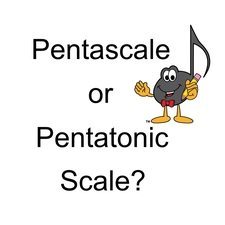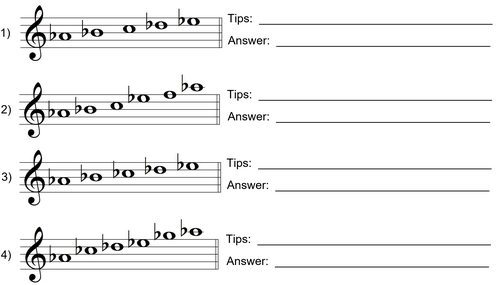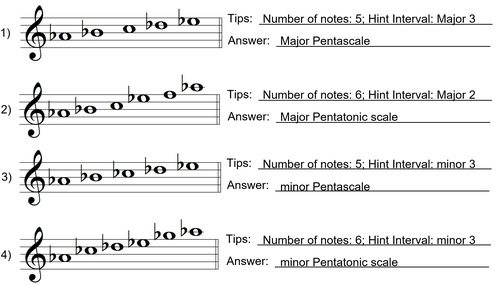Pentascale or Pentatonic Scale?

Pentascale or Pentatonic Scale - What's the Difference?
Pentascale or Pentatonic Scale - both contain the word "Penta" which means 5 and "Scale" which means degrees or notes. So is there a difference between a Pentascale and a Pentatonic scale?
Yes there is! So, which one is the Pentascale and which one is the Pentatonic scale? Are they Major or minor?
Pentascale or Pentatonic Scale - Pentascale Pattern
A Pentascale is a series of 5 notes in Alphabetical order.
The Pattern of a Major Pentascale is:
1 - Whole Step - 2 - Whole Step - 3 - Half Step - 4 - Whole Step - 5.
This pattern is also the first 5 degrees of the Major scale.

The Pattern of a minor Pentascale is:
1 - Whole Step - 2 - Half Step - 3 - Whole Step - 4 - Whole Step - 5.
This pattern is also the first 5 degrees of the minor scale. (The first 5 degrees of a minor scale are the same for a natural minor, harmonic minor and a melodic minor.)

Pentascale or Pentatonic Scale - Pentatonic Scale Pattern
A Pentatonic scale is a pattern of 5 notes plus the repeated upper Tonic note - 5 (Penta) plus 1 (Tonic) - for a total of 6 notes.
Pentatonic scales are considered to be Transilient scales - scales that have fewer than 8 notes. Heptatonic scales are scales that contain 8 notes. They are scales like the Major scales, minor scales and modes. A Transilient scale will "jump over" (or skip) the absent notes.
The notes of a Major Pentatonic scale are the 1st, 2nd, 3rd, 5th, 6th and 8th degrees of the Major scale. (The Major Pentatonic scale jumps over the 4th and 7th degrees of the Major scale.)

The notes of a minor Pentatonic scale are the 1st, 3rd, 4th, 5th, 7th and 8th (upper Tonic) of the natural form minor scale. (The minor Pentatonic scale jumps over the 2nd and 6th degrees of the natural minor scale.)

Pentascale or Pentatonic Scale - How to Easily Tell the Difference
 In Ultimate Music Theory, we learn about Pentascales in Prep 1 Rudiments Workbook on Page 78.
In Ultimate Music Theory, we learn about Pentascales in Prep 1 Rudiments Workbook on Page 78.
In the Advanced Rudiments Workbook, Pentatonic scales are introduced on Page 32.
Here are some helpful hints on how to easily tell the difference:
Number of Notes:
- A Pentascale has 5 notes.
- A Pentatonic scale has 6 notes (the first and last note will be the same note name).
The "Hint" Interval:
- A Major Pentascale has an interval of a Major 3rd between the 1st and 3rd notes.
- A minor Pentascale has an interval of a minor 3rd between the 1st and 3rd notes.
- A Major Pentatonic scale has an interval of a Major 2nd between the 1st and 2nd notes.
- A minor Pentatonic scale has an interval of a minor 3rd between the 1st and 2nd notes.
Pentascale or Pentatonic Scale - Pop Quiz!
It's that time again - Pop Quiz Time! Can you use the hints that you learned in this Blog to identify these scales in less than 10 seconds? 3-2-1-GO!

If you are a Student looking at how to learn Theory easily, please check out our online UMT Complete Music Theory Course. Glory St. Germain will walk you through all the tips and tricks to learn theoretical concepts quickly and easily.
If you are a Teacher looking for ways to teach Theory so that your students "get it", then please check out our online UMT Certification Course. Glory St. Germain will teach you HOW to teach theory...and so much more!
And now, here are the answers to the Pentascale or Pentatonic Scale Pop Quiz:

Let me know how you did!

Teach Intervals Online Course is a Teacher Training with 6 Video Sessions plus downloadable worksheets on the What, Where & Why Secrets for Teaching Intervals.
To help you even more we've created FREE RESOURCES for you to use as learning tools and building blocks in your musical adventure.
Keep on Learning... With a Smile and a Song!
Shelagh McKibbon-U'Ren


Thanks for this very clear teaching point, Shelagh. As usual, you are the most amazing theory teacher I know. Cheers!
Thanks so much Melrose! It was a lot of fun to write!
Shelagh
This is an interesting turn for the use of term Penta, could you please tell me what musical purpose it can serve for me regarding theory development or improvisation development it provides. I know the benefits of the pentatonic scale in regards to improvisation of modern music but I need enlightenment as to how the pentascale can be of use to me?
The Pentascale is the foundation for the Circle of Fifths. (The distance between every letter on the Circle is a Pentascale.) When teaching, most modern method books use terms like “C Position” or “G Position”. I scratch out that word Position and use Pentascale! My students then learn how easy it is to transpose when they just move their fingers to a new/different Pentascale.
Here is the blog for this: https://ultimatemusictheory.com/pentascales/
I hope that this serves as a starting point for you to start exploring Pentascales! They are one of my favorite concepts to teach!
Shelagh
Thank you sooo much. Never found this so clear. Really a lot of thanks. Planning to buy the complete rudiments workbook.